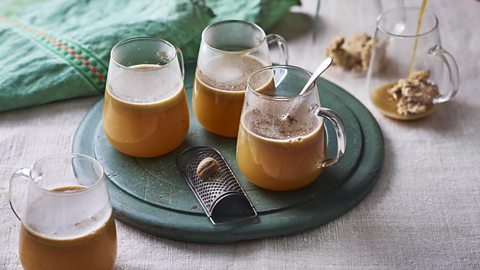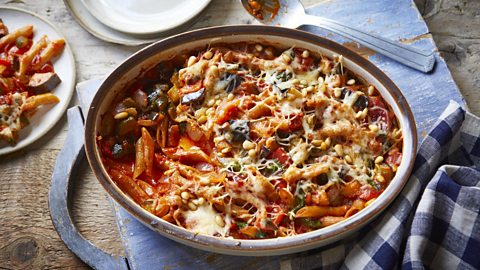Can you improve perimenopause and menopause symptoms through your diet?
October is World Menopause Month, a time to shine a light on the menopause and the support and information available to help manage it. There are 13 million people in the UK living with it, and symptoms are often debilitating β but could tweaking your diet help?
By Lauren Potts

It affects half the global population at some point in their lives (typically between the ages of 45 and 55), yet many symptoms of both the perimenopause and menopause are difficult to manage. Perhaps the most common effects are those dreaded hot flushes, night sweats and brain fog β but each personβs experience is unique and the impact it has on individuals can hugely differ.
Itβs estimated that about 13 million people β roughly a β is either perimenopausal or menopausal, and potentially experiencing a range of physical and psychological symptoms that can last several years.
Though the major menopause indicator is that monthly periods stop due to declining levels of oestrogen, there are 34 recognised symptoms from poor sleep, anxiety and low mood to headaches, recurrent urinary tract infections, itchy skin and heart palpitations. For those who are perimenopausal, symptoms can be very similar.
A reported 44% of women suffer with three or more severe symptoms according to a , and 77% find at least one βvery difficultβ. Itβs unlikely someone would experience every symptom β and theyβre not constant, says Jenny Haskey, chief executive of The Menopause Charity β but knowing what they are can make managing menopause easier.
βItβs really important we donβt scare women [when talking about the menopause] and the way to do that is to arm them with the information and knowledge they need in a way that doesnβt make them dread it, but makes them understand whatβs happening and what they need to do to move forward and thrive,β she says.
Customise your diet
Dr Linia Patel, a registered dietitian and author of Food for Menopause explains that both perimenopausal and menopausal dietary advice is the same: βThe fundamental principles of good health remain consistent: proper hydration, maintaining balanced blood glucose levels, following an anti-inflammatory diet, and nourishing your gut bacteria. However, individual variations come into play, especially as they relate to the specific symptoms you're experiencing. This is why itβs essential to track your symptoms and truly know yourself.β
Itβs worth thinking carefully about your symptoms and identifying any food or drink that could exacerbate them, suggests Haskey. Thatβs not to suggest you cut them out entirely, βbut itβs about being mindful of how you respond when you eat or drink them and, if they are having an impact, reducing them.β
For example, if poor sleep or heart palpitations are a factor, cutting back on caffeine might help, she suggests. If night sweats and hot flushes are an issue, it might be sensible to take spicy foods off the menu on most days.
Patel, points out that excess alcohol can also make symptoms worse because the liver enzymes responsible for metabolising alcohol decrease during menopause.
Hot buttered apple juice
Alcohol-free drinks can be just as delicious β and this one is a real winter warmer, too

βSpoiler alert β alcohol and menopause are not the best of friends,β she says. βIt can have an impact on symptoms from hot flushes to mood swings and can make weight loss and sleep harder.β
Patel says thereβs a common misconception that βcarbs make you fat, inflamed and sluggishβ during menopause but the key is choosing the βright ones and the right portionsβ. Symptoms like weight gain can in part be caused by eating too much sugar and too many refined carbohydrates, she explains. But fatigue, headaches, sugar cravings and irritability could actually be caused by a lack of complex carbs like wholegrains, beans and lentils.
βThey contain fibre and protein which means they are good for helping control your blood sugar levels.β
Healthy pasta bake
Made with wholemeal pasta, this dish is comforting but wonβt leave you feeling sluggish

Can specific foods ease symptoms?
Complex carbs also contain phytoestrogens which, if eaten regularly and in sufficient quantities, can start to have . Some evidence suggests that phytoestrogens β and in particular a type called isoflavones found in tofu, tempeh and soya milk β have a positive impact on menopause symptoms.
found 85% of North American women suffered with hot flushes compared to only 25% of Japanese women β potentially because Eastern Asian diets are much higher in isoflavones than Western diets. This thinking is echoed in an analysis of previous research which found a link between isoflavones and .
Meanwhile, a into a different phytoestrogen called lignans β found in flaxseed (also known as linseed) β suggested eating 40g a day could also alleviate hot flushes as well as vaginal dryness, another common menopause symptom.
Nigellaβs breakfast bars contain flaxseed along with berries and other seeds
But although the results sound encouraging, the European Food Safety Authority concluded the current evidence is because some studies showed benefits while others did not. The British Nutrition Foundation (BNF) warned that more research is also needed to confirm the safety and effectiveness of herbal remedies marketed to help relieve menopausal symptoms such as red clover (a source of isoflavones), black cohosh, and St Johnβs wort.
βMenopause has been heavily over-commercialised and thereβs still a lot of misinformation and areas where people are profiting from potentially vulnerable women,β adds Haskey.
The importance of following a heart healthy diet
Unfortunately those who are menopausal are at higher risk of having raised and .
Patel explains: βIt's well known that oestrogen helps protect heart health, but only recently have we begun to fully understand just how significant this protection is and what happens when it's lost during menopause. Oestrogen, particularly the type called E2, plays a key role in managing cholesterol levels. It helps lower the risk of fat buildup in the arteries, keeps blood vessels healthy, reduces oxidative stress, and prevents blood clotting.
βAs oestrogen levels drop during menopause, cholesterol levels tend to changeβ'bad' LDL cholesterol and triglycerides increase, while 'good' HDL cholesterol decreases. These changes can lead to fat accumulation in the arteries, forming atherosclerotic plaques and raising the risk of heart disease.β
To help lower cholesterol, follow a heart-healthy diet says the expert:βThis can include, increasing fibre intake (whole grains, pulses, fruits, vegetables), choosing healthy fats like extra virgin olive oil, cold pressed rapeseed oil and foods high in omega-3s (found in fish, flaxseeds, and walnuts), limiting saturated and trans fats (found in processed and fried foods) and including plant-based proteins (legumes, tofu).β
Lokanta stew
This Turkish dish contains elements of the Mediterranean diet

Simple steps to boosting your diet
Patel says you should regularly ask yourself these simple questions:
- How much water do I drink each day and when do I drink it?
- Which is my biggest meal of the day?
- Are my meals balanced?
- Do all of my meals and snacks have a source of protein?
- How many times a week do I have beans and lentils in my diet?
- How many snacks am I having per day and what am I snacking on?
- Is my plate loaded with veggies or fruit?
- How many different types of plants do I eat?
- How much alcohol do I drink a week?
The reason? The importance of eating a well-balanced diet β and avoiding dehydration β cannot be underestimated, say all the experts.
During menopause, Haskey recommends eating a Mediterranean diet which typically includes fruits, vegetables, legumes and pulses, nuts, wholegrains, fish and unsaturated fats such as olive oil. It also calls for a moderate amount of dairy, which is regarded as important during and after the menopause when falling oestrogen levels can increase the risk of osteoporosis, explains Sara Stanner, BNFβs science director.
Chickpeas are a great source of protein and are often cheap, too
Holistic approach
Haskey says itβs not solely about eating a balanced diet but also being adaptable and mindful, such as knowing your trigger foods and making sensible swaps when sugar cravings hit. And while some women might only want to manage symptoms through nutrition, she says it can be beneficial to consider other methods in combination with diet.
βWe do need to eat differently when we hit menopause β we need to be even more conscious about having that balanced diet and also coupling it with exercise. Itβs about taking a holistic approach to manage everything.β
Thereβs also no harm in thinking about making positive lifestyle changes before menopause even starts, adds Dr Patel.
βItβs never too early to start preparing to eat well, make movement a habit, and learn to manage your stress. All these things will make the menopause journey easier.β
βUnderstanding your own body is key. Be aware of what is βnormalβ for you, so you can recognise any shifts or changes. Since no two journeys are alike, it's important to regularly assess how youβre feeling. Having an active role in your health is called self-management support. The more knowledge you have, the more you can get the specific support that you need.
βI recommend making a symptom check-in part of your self-care routine. Take 10 minutes once a month, relax with a cup of tea, and reflect on any changes youβve noticed in your body and wellbeing.β
Originally published September 2023. Updated October 2024